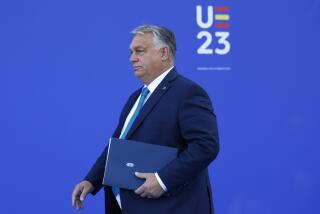Happy Birthday, EU! (But forget the party)
- Share via
LAST WEEK, I went to Paris for lunch. I took the Eurostar. I paid with my Societe Generale credit card. I bought my Metro ticket with euros. In making my travel plans -- train not plane, Metro not taxi -- I was mindful of the European Union’s new commitment to cut greenhouse gas emissions. In the restaurant, my French was rather rusty, but the waiters were happy to speak in English. They were probably Polish anyway.
So you can understand why (especially after three delicious courses and half a bottle of Bordeaux) I felt ready to toast the Treaty of Rome, the founding charter of the present-day European Union, which was signed 50 years ago today.
Who could possibly wish to return Europe to its pre-1957 state of fragmentation? Twice in the last half a century the Continent had torn itself apart. When peace finally came in 1945, whole cities lay in ruins. People were starving. Currencies were reduced to worthless paper.
So totally has life in Europe been transformed since then that you might expect the European Union to be universally adored at 50. Yet that is not the case. Only 46% of European Union citizens have a positive view of the EU, while more than a third believe their country has not benefited from EU membership. Support for the EU is lowest in Britain, where just 1 in 3 people regards EU membership in a positive light.
Does this merely illustrate the truth of the old saying that no good deed goes unpunished? Or are Europeans right to be somewhat Euro-skeptical?
Take the issue of the avoidance of war. The truth is that the EU has not been the principal guarantor of Europe’s peace. Rather, it was the American-led North Atlantic Treaty Organization that (in the famous phrase of NATO’s first secretary-general) kept “the Soviets out, the Americans in and the Germans down.”
What about the claim that the European Union has generated the Continent’s present prosperity? This is certainly not to be underestimated. True, in terms of raw output per capita, the United States is still ahead, but by a range of other measures it is Europeans who are better off. Whereas the average American worked about 1,800 hours in 2005, the average Austrian, Dane, Dutchman, Frenchman or German worked fewer than 1,500 hours.
At least six EU countries have higher productivity (measured by gross domestic product per hour worked) than the United States. Europe is also fairer: Income inequality is greater in the U.S. than in any EU country.
And Europe is healthier too. According to recent research, Europeans are living as much as 15 months longer than Americans. There is even evidence that they are growing taller too. Whereas the average American 60-year-old is about an inch taller than his or her German counterpart, among 20-year-olds it’s the other way round.
Yet Europeans are probably right not to give the EU much of the credit for their high standard of living. One of the paradoxes of European integration has been that, even as the EU has expanded its range of responsibilities, so too have national governments. Government expenditure today is a much larger share of gross domestic product than it was in 1957.
Indeed, it is hard to find a clear “EU effect” on economic growth. Between 1973 and 1998, for example, non-members did just as well as new members and better than founding members. Growth after 1957 was determined more by national policies and by global economic conditions than by European integration.
As we mark the EU’s 50th birthday, then, let’s remember what the Treaty of Rome actually did. It committed six countries to create a customs union (with a single external tariff and gradually reduced internal trade barriers) and common policies for agriculture, transport and social policy. That was all.
Much has happened since those days, of course. The six have become 27. Thirteen of them now share their own currency. European law now reigns supreme. And the customs union has become a (still imperfect) single market. Yet, at root, the EU remains not the federal super-state of conservative nightmares but a confederation whose primary concern is trade policy.
The deal reached with the U.S. last week on transatlantic air routes is far from perfect, but it is a great deal better than any individual European state could have hoped to achieve by negotiating solo.
*
THE REAL REASON that the EU is unloved is the often glaring discrepancy between its aspirations and this somewhat prosaic reality. And yet Europe’s leaders persistently refuse to see this. No sooner have they quietly acknowledged that they have no chance of making Europe “the most competitive and the most dynamic knowledge-based economy in the world” by 2010 -- the goal set at Lisbon in 2000 -- than they embark on an equally unrealistic plan for a 20% reduction in carbon dioxide emissions by 2020.
Am I the only person in Europe wondering how cheaper transatlantic air fares are going to help achieve this? Oh, what the hell. The next time I want lunch in Paris, perhaps JetBlue will be flying a shuttle.
*
nferguson@latimescolumnists.com
More to Read
Sign up for The Wild
We’ll help you find the best places to hike, bike and run, as well as the perfect silent spots for meditation and yoga.
You may occasionally receive promotional content from the Los Angeles Times.




